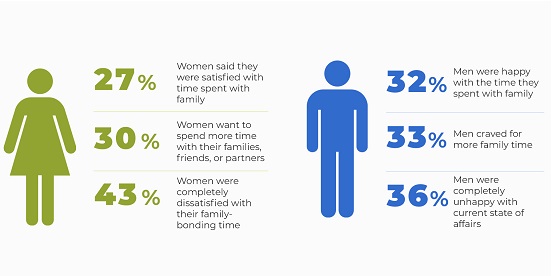Given the pace of technological developments, workplaces are undergoing a rapid transformation worldwide. With increasing awareness and better spending power, employees want to spend quality time doing things they love apart from work thus placing more emphasis on work-life balance (WLB) than ever before.
Monster in India conducted a survey to understand the pulse of the Indian workforce around work-life balance and found that more than half of the working professionals surveyed rated their current work-life balance average to terrible. Men seemed to be more content and less stressed compared to women when it came to work-life balance between the two genders.
The survey revealed that men and women have similar concerns and thoughts around work-life balance albeit in different proportions.
Revelation: Family time matters as much to men as women

Contrary to the popular perception that women prefer to spend more time with family, the survey found that men also crave for the same. This is interesting because men are perceived as workaholics. In fact, the percentage of men wanting more family time was marginally higher than that of women.
Ironically, despite ‘spending time with family’ being a preference for both women and men, only 12% women responded that their spouse help them take care of the kids, whereas a significant 65% men said that their spouse took care of the children. When women with children were asked as to who helped take care of children while they worked, 44% replied in-laws/parents, while 17% said domestic help like a nanny.
Commute to work was another time-guzzler according to the survey. Most men and women spent considerable time traveling to work. That is why almost 44% men and 37% women, wanted to opt to work from home to avoid the commute and save time. However, compared to men a smaller number of women prefer to work from home.
If you are a working professional with nuclear family and are concerned about the long commute to work, it’s prudent to discuss your concerns with the HR and get clarity on company policies. Many companies these days offer work from home and/or flexibility in timings.
Moreover, you may consider having a heart-to-heart chat with your supervisor to see what can be done to bring in more flexibility.
Can a good boss make a difference to WLB?

Not only is there clarity among the Indian workforce regarding the policies in favour of a good WLB but even the supervisors also understand the importance of it. Among the respondents, as many as 41% females and little more than 50% males attested to the fact that their manager helped them maintain a balance between their work and other spheres of their life.
This is an important insight as we often hesitate in approaching our seniors to discuss our personal issues.
As opposed to a mere 36% of males and 38% of females who complained that their manager believed WLB to be nothing more than a fad. Is this shift in attitude among management indicative of a change in the corporate mindset?
Having more “me time” matters

Both men and women divulged what WLB meant to them and what factors could contribute to achieving it. On being asked how stressed they felt about work, and whether it haunted them in their free time as well, 46% women admitted ‘stretched and stressed out’ compared to 34% men when asked if they are able to balance their work and life. The feeling is similar, when it comes to worrying about work outside working hours – 58% women either often, or sometimes worry about work compared to 49% men.
The inability to switch off from work can be detrimental to one’s health. It indicates high levels of stress and could be a precursor to fatigue and early burnout.
Both genders voted technology as the biggest hindrance to balancing work and personal commitments – 27% women and 35% men.
It is usually believed that men are more tech-savvy and in love with their gadgets, but it was surprising to see that more men viewed technology a hindrance compared to women.
As opposed to work-life integration, the survey revealed irrespective of gender, both men and women want a clear demarcation between work and personal life. When asked, if given a choice which work-life arrangement would they prefer, 76% men and 82% women wanted to be ‘segmentors – people who create clearly defined boundaries between their personal and work lives.’
In view of this, both genders rated having flexible working hours as a huge contributor towards WLB. Both felt that leaving work on time contributed the maximum to their well-being- 43% women and 45% men.
Another factor that both genders saw as crucial to work-life balance was having time to pursue their hobbies and other interests- 17% women and 18% men. Other than these, leading influencers for achieving happiness and fulfilment were having the option of completing work from home, keeping work and personal life separate, and having non-working weekends among others.
Does good work-life balance mean better productivity?

Both men and women agreed that having a good WLB can enhance productivity and positively impacts business.
It’s clear that when your worries are taken care of, and your life is spent proportionately doing things that matter to you, it is obvious work will become your prime focus, thus helping organizations grow.
For more insights take a look at the infographic based on the survey here.




